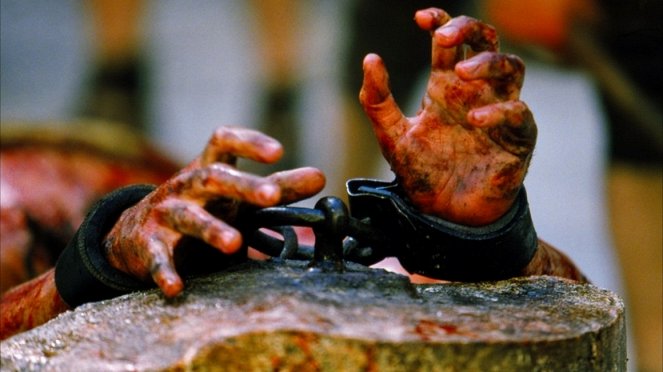Directed by:
Mel GibsonScreenplay:
Mel GibsonCinematography:
Caleb DeschanelComposer:
John DebneyCast:
James Caviezel, Maia Morgenstern, Hristo Jivkov, Francesco De Vito, Monica Bellucci, Mattia Sbragia, Toni Bertorelli, Luca Lionello, Hristo Shopov (more)VOD (1)
Plots(1)
The Passion of the Christ focuses on the last twelve hours of Jesus of Nazareth's life. The film begins in the Garden of Olives where Jesus has gone to pray after the Last Supper. Jesus must resist the temptations of Satan. Betrayed by Judas Iscariot, Jesus is then arrested and taken within the city walls of Jerusalem where leaders of the Pharisees confront him with accusations of blasphemy and his trial results in a condemnation to death. (official distributor synopsis)
(more)Videos (1)
Reviews (8)
Gibson has undoubtedly achieved what he set out to do, and it can’t be denied that the film has a powerfully immersive atmosphere and an impressive level of craftsmanship in some moments. Unfortunately, however, it fails where it wanted to be strongest: as a story about an unjust amoral judgment, about the failure of human faith and the rekindling of hope for its resurrection. Gibson relies only on the general idea that Jesus was a benevolent shepherd and that we must automatically pity him in his suffering, so he disregards any coherence of message and half-heartedly presents boring flashbacks or shocking physical torture that lasts unnaturally long and becomes the main motif of the entire film. And although I had a really big lump in my throat at the finale and watched the horror with bated breath, I don't understand why something like this was made in the first place. Or I do, for money, of course. The very idea and structure of the work are too simple and misleading to translate into something more historically and cinematically valuable or inspiring.
()
I find this film hard to rate, even after a second viewing. If I were to rate only the major part of the film that precedes the journey to Golgotha, it would be 5 stars. Brilliantly played Pilate, Herod is an outright treat despite the small space and Mattia Sbragia is very convincing as the resolute Caiaphas. I really enjoyed the scenes of Pilate and Jesus together. The much criticized flashbacks are impressive and especially the one with Mary and Jesus at the table is really beautiful and full of emotions. But starting with The Road to Golgotha, Gibson's film loses its impact. Gibson made Christ a being who, by superhumanly overcoming all the immense hardships, seems implausible. I would argue that less is sometimes more, that a few slashes to the skin would be more painful and real than all those cuts covered in blood on something that used to resemble a human body. As a result, Christ’s suffering loses its human dimension. Also, the scene when a raven pecks out the eye of one of the crucified thieves has no support in the Gospels and smacks strongly of gratuitousness. Yet, I have to admit that the film has a certain amount of power, multiplied by the visit to the cinema, where everyone sat until the end credits finished rolling, which I haven't experienced for a long time. As an afterthought, I acknowledge that my original criticism about the total lack of ideas, and that it doesn't even come close to Scorsese's The Last Temptation of Christ is perhaps a bit off the mark. This film is not supposed to explain anything, to introduce characters in a clear way so that average viewers can understand. Perhaps the renowned Roger Ebert wrote it most succinctly: "This is not a sermon or a homily, but a visualization of the central event in the Christian religion. Take it or leave it.” But the question remains, is this film necessary? Gibson's artistic statement is ideally suited to a time when, thanks to the permanent threat of terrorism, the world is exposed to a clash of civilizations, a clash of religious principles, and the huge success of the film in the US can be attributed to the need for ideological refuge. And history repeats itself in cycles. The clashes among the Abrahamic religions – Judaism, Christianity and Islam – have and will continue to cause much blood and suffering. And it's not so much a problem of religion itself, but rather of the animal species called homo sapiens stupidus, which has a coded need for fight and cruelty, which is very clear in several scenes in Gibson's film. Let that be to his credit.
()
No hyperactivity turning to faith and as a result fortunately no exaggerated controversy. The crucifixion is brutal and cruel, but also impressive, touching, and surprisingly grand. Its fascinating atmosphere drew me in despite some prejudices, and I am glad that ten years after its creation, Gibson's opus is finally receiving positive reviews. This film is definitely not easy to love, but it is quite easy to be amazed by it.
()
The Passion of the Christ is another in a series of highly controversial and (in terms of ratings) divisive films, and after watching it I'm inclined to give it a better rating. The breathtaking last twelve hours of the life of Christ were truly an unspeakable ordeal, and Mel Gibson makes that very clear here. Since these religious things are beyond me, I didn't understand the plot or the characters at times, but eventually gave in. Technically, I don't have much to complain about: impressive music, well placed cinematography and aptly edited shots. Christ's makeup deserves a shout-out, as does his performance by James Caviezel. In short, a film that could have been twenty minutes shorter, but as far as feelings go, they're pretty solid.
()
Those brutal scenes that everyone take dso much about weren't really that terrible. Rather than being naturalistic, they were just very bloody. In terms of craftsmanship, it is again precise, but that is not new for Mel Gibson. As for the content, there is nothing left but to describe it as controversial. The music is breathtaking.
()
Gallery (99)
Photo © 2004 Icon Productions



Ads